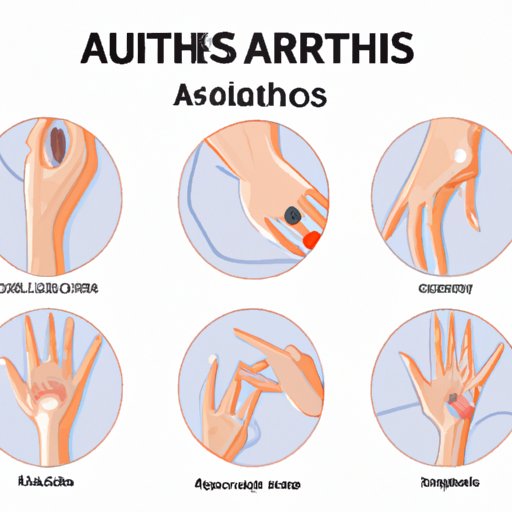Introduction
Arthritis is a condition that affects millions of people worldwide, causing pain, stiffness, and inflammation in the joints. It can impact individuals of any age, gender, or ethnicity, and can lead to reduced mobility and quality of life. Arthritis can be caused by different factors, including injury, infection, and genetics. However, one matter that has been a topic of debate in the medical community is whether arthritis is an autoimmune disease. This article aims to debunk the myths surrounding the connection between arthritis and autoimmunity and provide a comprehensive exploration of scientific evidence on the subject.
Understanding Arthritis: Debunking the Myths of Autoimmunity
Before discussing the link between arthritis and autoimmunity, let’s define arthritis. Arthritis is a condition characterized by inflammation and pain in the joints of the body. There are over 100 types of arthritis, with osteoarthritis and rheumatoid arthritis being the most common forms. Osteoarthritis is a degenerative joint disease caused by wear and tear on the joints over time, while rheumatoid arthritis is an autoimmune disease that causes the body’s immune system to attack its own joints.
Autoimmunity refers to a process in which the immune system mistakenly attacks the body’s own tissues, causing inflammation and damage. Autoimmune diseases can affect any organ or tissue in the body, and over 80 types of autoimmune diseases are currently known. Examples of autoimmune diseases besides rheumatoid arthritis include lupus, multiple sclerosis, and celiac disease.
One of the common myths about arthritis is that it’s always caused by an autoimmune reaction. This is not accurate, as many different factors can trigger arthritis, including joint injury, infection, or metabolic conditions. However, some types of arthritis, such as rheumatoid arthritis, are indeed autoimmune diseases, which means they are caused by an abnormal immune response that attacks the body’s own tissues, specifically the joints in the case of rheumatoid arthritis.
The Link Between Arthritis and Autoimmunity: A Comprehensive Exploration
Autoimmune diseases are complex and can affect various aspects of the body’s immune system. In general, autoimmune diseases arise when the body’s immune system mistakenly identifies its own healthy cells as foreign or antigens, triggering an attack against them. The immune response leads to inflammation, which damages the affected tissues and organs.
Autoimmune diseases can be classified as either organ-specific or systemic. Organ-specific autoimmune diseases affect only one organ or type of tissue, while systemic autoimmune diseases affect multiple organs and tissues in the body, such as the connective tissue or blood vessels.
Studies have shown that autoimmunity plays a significant role in some forms of arthritis, such as rheumatoid arthritis. In rheumatoid arthritis, the immune system mistakenly attacks the synovial membrane lining the joints, causing joint inflammation, stiffness, and damage. Research has also suggested that other forms of arthritis, such as psoriatic arthritis and ankylosing spondylitis, may also have autoimmune components.
The risk factors for developing arthritis or an autoimmune disease depend on a combination of genetic and environmental factors, with some diseases being more strongly linked to certain genes or environmental triggers than others. For example, rheumatoid arthritis has been linked to specific genes such as the HLA-DR4 or HLA-DR1 gene and environmental triggers such as smoking or exposure to certain infections.
Uncovering the Relationship Between Arthritis and Autoimmune Disorders
Individuals with one autoimmune disease may be more likely to develop another autoimmune condition. According to the American College of Rheumatology, around 25% of people with rheumatoid arthritis have at least one other autoimmune disease, with the most common ones being thyroid disease, celiac disease, and lupus.
Moreover, having other autoimmune diseases can affect how arthritis presents and progresses. For example, individuals with rheumatoid arthritis and celiac disease tend to have more severe joint symptoms and faster progression of joint damage than those with rheumatoid arthritis alone.
It’s also essential to distinguish between rheumatoid arthritis and other types of arthritis, such as osteoarthritis and gout. Osteoarthritis is caused by the wear and tear on joints over time and is primarily due to age, weight, or injury. Gout, a type of arthritis caused by the buildup of uric acid crystals in the joints, is linked to diet and lifestyle factors, such as alcohol consumption and a high-purine diet.
A Closer Look at Rheumatoid Arthritis: An Autoimmune Disease
Rheumatoid arthritis is an autoimmune disease that affects around 1.3 million Americans and three times more women than men. It’s characterized by joint inflammation and pain, leading to reduced movement and function over time. Rheumatoid arthritis can also affect other organs, such as the lungs and heart, and can lead to systemic symptoms, such as fever, fatigue, and weight loss.
Diagnosing rheumatoid arthritis typically involves a combination of clinical exams, blood tests, imaging tests, and other assessments. Early detection and intervention are crucial to prevent joint damage and disability. There is no cure for rheumatoid arthritis, but several treatment options can slow its progression and reduce symptoms, such as nonsteroidal anti-inflammatory drugs (NSAIDs), disease-modifying anti-rheumatic drugs (DMARDs), biologic agents, and corticosteroids.

Arthritis as an Autoimmune Disease: What You Need to Know
If you have arthritis or an autoimmune disease, it’s vital to seek medical treatment promptly to improve your quality of life and prevent complications. The following are steps you can follow:
- Consult your doctor or a rheumatologist for correct diagnosis and management of your condition.
- Follow your prescribed medication regimen and attend regular check-ups to monitor your disease progression and avoid complications.
- Make healthy lifestyle changes, such as regular exercise and a balanced diet, to help manage your symptoms and improve your overall health.
- Practice self-care, such as stress management techniques and avoiding harmful behaviors like smoking and excessive drinking.
The Science Behind Arthritis: How Autoimmunity Plays a Role
Research into the causes and treatments of autoimmune diseases and arthritis is ongoing and continues to yield new findings and insights. Some of the current and emerging areas of study in the field include:
- The role of genetics in autoimmune diseases and arthritis.
- The immune system’s response and how it affects individuals with arthritis.
- New and emerging treatments, such as small molecule inhibitors and gene therapy.
- The link between environmental factors, such as diet and pollution, and autoimmune diseases.
Conclusion
In conclusion, arthritis can be caused by different factors, but some types of arthritis, such as rheumatoid arthritis, are autoimmune diseases that arise from the immune system attacking the body’s own tissues. Autoimmunity and arthritis have a complex and often misunderstood relationship, with studies showing that autoimmune components can play a significant role in some forms of arthritis. It’s vital to seek medical treatment promptly if you have arthritis or an autoimmune disease, as early detection and intervention can prevent complications and improve your quality of life. By following a healthy lifestyle, practicing self-care, and spreading awareness about arthritis and autoimmune diseases, we can help prevent and manage these conditions effectively.
